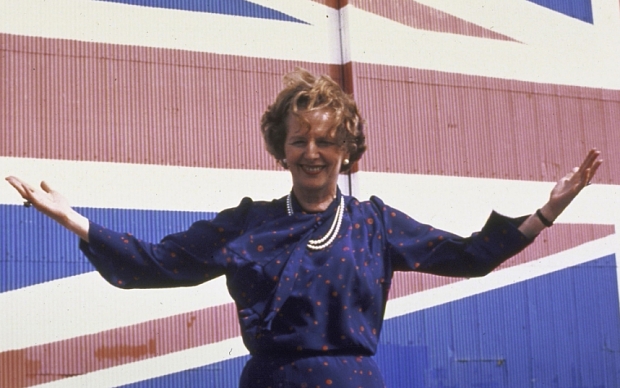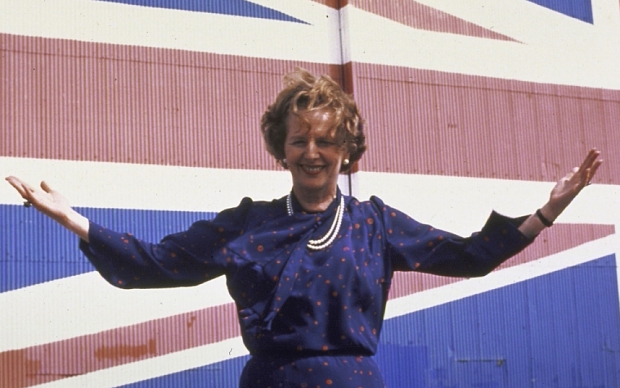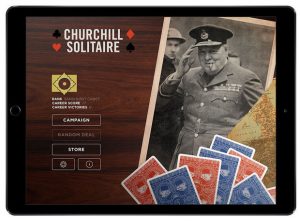
Bulletin #92 - Feb 2016
Apex of the Iron Lady

February 11, 2016
Margaret Thatcher: The Authorized Biography, Volume Two: Everything She Wants By Charles Moore; Published by Allen Lane, 2015, 880 pp.
Reviewed by JOHN CAMPBELL
The late Lady Thatcher was an honorary member of The Churchill Centre and recipient of of the Centre’s Churchill Leadership Award. The Chartwell Bulletin invited distinguished political biographer John Campbell to review the newest installment in the official biography of the Iron Lady.
Just three years after her death, Margaret Thatcher ranks second only to Churchill as the towering figure of twentieth century Britain. The second instalment of Charles Moore’s monumental official biography—now projected to take three volumes—is very different from the first, but equally good. Whereas most of the first volume followed her early life and her remarkable journey from provincial Lincolnshire to Number Ten Downing Street, this one covers just five years—the central five years of her decade in power—so that it deals almost entirely with the business of government, since Mrs. Thatcher had no other interests and allowed herself virtually no time off. Lacking the clear biographical structure of a formative beginning or a mortal end, this middle chunk of her life could easily have been a shapeless and indigestible chronicle of events. That it is not, but grips the attention for 700 pages, is due to three things: the historic scale of the issues she had to deal with, Moore’s skill in drawing together a truly enormous range of public and private sources, and the hyperactive and commanding personality of the Prime Minister herself.
With the luxury of hindsight these years were the high noon of Thatcherism when the Iron Lady, triumphantly re-elected on the back of military victory in the Falklands war, transformed the British economy by selling back to private enterprise most of the public utilities nationalised by the Labour government after 1945—notably telephones, gas, electricity, and British Airways—opening up the London financial market to global competition, cutting taxes and facing down the challenge of the militant trade unions, greatly assisted by a divided opposition and cushioned by the bonus of North Sea oil, before cruising to another landslide majority and an unprecedented third term in 1987.

2024 International Churchill Conference
At the time, however, it did not feel so easy. Privatisation was less the carefully planned rolling-out of an ideological programme than a series of risky ad hoc expedients which flunked the opportunity to introduce more competition. Unemployment remained shockingly high, while the crucial confrontation with the coalminers turned into a violent and divisive year-long confrontation which could easily have ended in defeat for the government if the miners’ leader, Arthur Scargill, had played his cards less crassly. Irish republicans came close to assassinating the Prime Minister with a massive bomb planted in her hotel at the Tory party conference in 1985; and a trivial turf war over a small helicopter company blew up into a crisis of trust which very nearly brought her down in 1986. Labour was actually ahead in the opinion polls for much of the Parliament. Even as she appeared to be carrying all before her, therefore, Mrs. Thatcher never felt secure: during the 1987 election campaign she was seriously afraid that she was going to lose.
Please help support The Churchill Centre
Purchase your copy from Amazon.com with the following links:
Volume I: From Grantham to the Falklands
Volume Two: Everything She Wants
At the same time, however, she was emerging as a major player on the international stage, where by 1983 she was already the longest-serving leader among the G7 nations. While consolidating the close political and personal alliance she had already forged with Ronald Reagan she simultaneously developed a combative but fruitful relationship with the new Soviet leader Mikhail Gorbachev, thereby helping to broker the nuclear disarmament talks which eventually—after some alarm when she thought Reagan was willing to bargain away Britain’s nuclear deterrent-enabled the West’s bloodless victory in the Cold War. She played a weak hand brilliantly in negotiating with the Chinese leader Deng Xiaoping the best possible deal for Hong Kong when the British lease ran out in 1997; and played a brave and unappreciated role in nudging the South African president F. W. de Klerk towards recognising the African National Congress, releasing Nelson Mandela and ending apartheid. Nearer home she was persuaded against her instinct to sign the breakthrough Anglo-Irish Agreement which led eventually to Tony Blair’s “Good Friday” settlement in Northern Ireland; and ironically, despite her deep suspicion of the European Union, she gave decisive momentum to the creation of the European single market, which she later regretted.
The main outline of all these big stories was already known from previous biographies and memoirs. Compared with his first volume, where Moore had access to genuinely new material about Margaret Roberts’ early life, there is surprisingly little in this second volume that is really revelatory. What gives his account its fascination and authority is the exceptional level of vivid detail about the processes of diplomacy and decision-making that his status as the official biographer has enabled him to deploy. For a start, he has interviewed practically everyone involved—colleagues, opponents, advisers and civil servants—who gave him their version of events with a candour that came of knowing that their words would not be published until after Lady Thatcher’s death, and in many cases lent him their private diaries of the time. Then he had access not only to the British and American, Soviet, French, and Irish government archives but also—much less formal and more revealing—the Prime Minister’s private papers, including the Cabinet Secretary’s unofficial notes of Cabinet meetings, the sometime blunt advice of her press secretary, and the briefings she received from all sorts of official and unofficial sources, on which it was her habit to scrawl her unguarded thoughts, unconstrained by tact or bureaucratic euphemism. Mrs. Thatcher was not only immensely thorough and hard-working but almost certainly the last major political leader to do all her work on paper, before the age of e-mails and the internet—she disliked the telephone—so that we have an unrivalled, virtually daily, record of her doubts, hesitations, and calculations as revealed in her drafts, redraftings, and corrections, as well as her robust convictions and intolerance of anything she regarded as weak or flabby. Instead of the usual cautious officialese of government papers her furious personality burns on every page.
The portrait that emerges is not wholly admirable. Her treatment of colleagues was often appalling, making it easy to see why they eventually threw her out: she could be maddening, stubborn, unreasonable, and contradictory. But against that, her clarity of purpose, her ability to combine broad vision with mastery of detail, her work rate, and her unswerving dedication to the job as she saw it are nothing short of mind-boggling, and Moore’s meticulously constructed narrative—admiring but not uncritical—does her qualities full justice. If anything is lacking, it is any recognition of the downside of her legacy—notably the ever-widening gulf of inequality that increasingly disfigures British (as it does American) society: but maybe that is a subject for his concluding volume. The more she recedes into history, however, the more phenomenal Margaret Thatcher appears, compared with her bland successors—or indeed most of her predecessors. Charles Moore’s eagerly awaited third volume will complete a great biography of an exceptional life.
John Campbell is the author of The Iron Lady: Margaret Thatcher, from Grocer’s Daughter to Prime Minister (Penguin 2009) as well as major biographies of Edward Heath and Roy Jenkins.
Subscribe
WANT MORE?
Get the Churchill Bulletin delivered to your inbox once a month.





